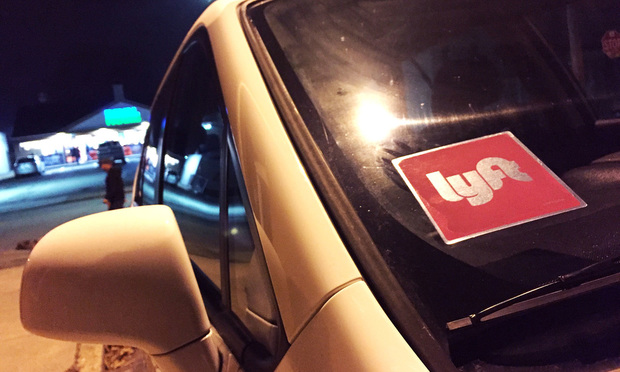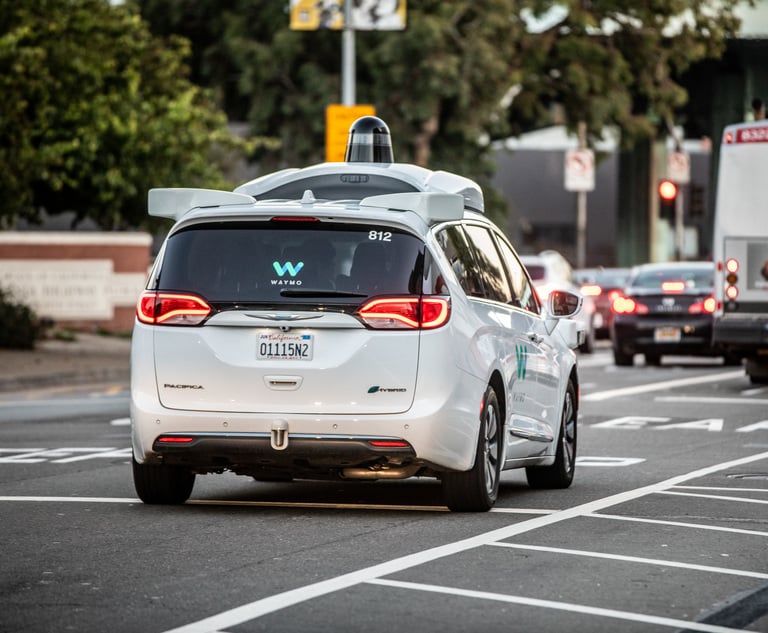SF Law Firm Hits Lyft With 13 Driver Sexual Harassment Suits With More Planned
Each week, attorney Laurel Simes of San Francisco's Levin Simes Abrams says her firm gets around five to 10 new calls alleging sexual harassment at the hands of ride-sharing drivers.
September 04, 2019 at 06:42 PM
6 minute read
 Photo: Diego M. Radzinschi/ALM
Photo: Diego M. Radzinschi/ALM
After investigating about 120 claims of sexual harassment or assault from Uber and Lyft drivers, Laurel Simes and her team at Levin Simes Abrams in San Francisco say they have uncovered an unsettling pattern among both companies' drivers.
First, they say, a driver might start asking inappropriate questions about sexual matters. Sometimes it's unwanted advances like, "Oh you look so nice tonight. Do you have a boyfriend?" Simes said. Other times, she says drivers wait until a rider gets out of their car to lunge and grope at them.
"Oftentimes, the person gets out of the car, and the driver says, 'You seem to be unsteady on your feet. Let me walk you to your door,'" Simes said. "And then they muscle their way inside and all hell breaks loose."
Many riders use Lyft because they've been out drinking with their friends, Simes said. "So they're trying to do something safe, and then look what ends up happening," she said.
Jane Doe 5 and Marianne Ditrani are the latest clients of the firm who claim they've been victims. Levin Simes filed the complaints on their behalf in San Francisco County Superior Court on Tuesday and Wednesday, respectively, marking the 12th and 13th time the firm has sued Lyft over alleged driver harassment.
According to the complaint in Doe's case, her friend ordered her a Lyft after they had been drinking Aug. 19. The lawsuit claims her driver pulled into a park after she fell asleep, and kissed and groped her breasts under her shirt. Doe claims she woke up during the incident and fought the driver off, injuring her finger.
The complaint claims Doe immediately reported the assault to the police. The driver admitted he kissed and groped the woman without her consent because she was "hot" and "he was not having sex with his wife," according to the complaint.
Ditrani's lawsuit claims she began to feel unsafe Oct. 5, 2018, when she noticed her Lyft driver was speeding through traffic erratically on the way from Hollywood to Santa Monica. According to the complaint, when Ditrani told her driver that he was going the wrong direction, he yelled at her and pushed his hand into her face. The complaint claims Ditrani began to cry, and her driver pulled off the highway into an alley. The driver locked her in the car and yelled at her, before she managed to run away, according to the complaint.
In both cases filed this week, Levin Simes is bringing 12 causes of action against San Francisco-based Lyft, including negligence, vicarious liability for assault and battery, and intentional and negligent misrepresentation.
Simes said drivers are not given proper training or questioning. "They don't even have a Skype interview," she said. "And then, they end up getting into these cars, and they are not being watched. There's no on-board camera system in the cars, so that someone can check and see what they are up to."
She also said that Lyft is not offering training to drivers discouraging them from getting out of the car with passengers, groping them or making sexual innuendo. "They don't talk about things like that, maybe they will now," she said. "We very much hope they do, and our clients do, too."
The complaint also asserts that Lyft's name-based background checks aren't sufficient. "While a name-based background check searches the applicant's reported name against various databases and compares records that have the same name, a fingerprint-based background check (or biometric check) uses the fingerprints of the individual to match against a law enforcement database, comparing records that have the same print, even if the names are different," Doe's attorneys write.
Fingerprinting has become an industry standard for taxis and other transportation companies, said Levin Simes attorney Meghan McCormick. In addition to running fingerprints against the FBI database before hiring a driver, Lyft could also use it to help confirm drivers' identity during each shift. "You can have fingerprinting on the app that would make the driver check in with his fingerprint, so that the same person that applied is actually the one driving," McCormick said.
Lauren Alexander, a spokesperson for Lyft, said the company does not use fingerprinting because of the discriminatory effect it has on many communities.
"The reason there's a discriminatory effect overall is because [the FBI] database includes anyone who has had contact with the police and been arrested, rather than actually charged with a crime," she said. "Communities of color oftentimes have higher interaction rates with police, and therefore those fingerprints for those communities are often caught up in those databases without any actual charges connected to them. If we were to use that [database], we would be ultimately discriminating against those communities."
Lyft has already rolled out a new system that combines driver's license verification and photographic identity verification. The company is also developing sexual harassment training that will be available for drivers and riders, Alexander said.
When asked if that's the intent of the recent string of suits, McCormick said it's not just about words.
"Our goal is for these companies to change their practices and implement a number of safety measures so they can truthfully make the claims that Uber was once making—so that they are indeed the gold standard of safety. It's not just about what is being said by the companies, it is about whether they are doing everything they can to keep their passengers safe."
At a minimum, McCormick hopes to raise awareness of the potential safety issues with ride-sharing platforms. "We've talked to a number of people who don't realize the number of occasions on which this is happening," she said. "This is not one or two cases here or there. We're talking about hundreds of cases, hundreds of instances of women being sexually assaulted, because they chose to take a Lyft home after they've been drinking and don't feel safe driving themselves."
In addition to the more than 100 cases the law firm is investigating, the attorneys report that they get around five or 10 new calls about similar allegations each week. Simes suspects that's just a portion of the women who actually seek legal action against drivers who engage in predatory behavior.
"We've had clients tell us that 'I almost didn't do anything. I was just going to take a hot shower and try to go to bed and forget this ever happened,'" Simes said. "Even though they were very distressed about it. And some people did that for a while and tried to compartmentalize it. And then they realize as they start seeing things in the news, 'Hey, wait something's going on here, and I can do something about this.'"
This content has been archived. It is available through our partners, LexisNexis® and Bloomberg Law.
To view this content, please continue to their sites.
Not a Lexis Subscriber?
Subscribe Now
Not a Bloomberg Law Subscriber?
Subscribe Now
NOT FOR REPRINT
© 2025 ALM Global, LLC, All Rights Reserved. Request academic re-use from www.copyright.com. All other uses, submit a request to [email protected]. For more information visit Asset & Logo Licensing.
You Might Like
View All
Shareholder Democracy? The Chatter Musk’s Tesla Pay Case Is Spurring Between Lawyers and Clients
6 minute read
Willkie Farr & Gallagher Drives Legal Challenge for Uber Against State's Rideshare Laws
5 minute read

EPA grants California authority to ban sales of new gas cars by 2035. Action faces reversal by Trump
Trending Stories
Who Got The Work
J. Brugh Lower of Gibbons has entered an appearance for industrial equipment supplier Devco Corporation in a pending trademark infringement lawsuit. The suit, accusing the defendant of selling knock-off Graco products, was filed Dec. 18 in New Jersey District Court by Rivkin Radler on behalf of Graco Inc. and Graco Minnesota. The case, assigned to U.S. District Judge Zahid N. Quraishi, is 3:24-cv-11294, Graco Inc. et al v. Devco Corporation.
Who Got The Work
Rebecca Maller-Stein and Kent A. Yalowitz of Arnold & Porter Kaye Scholer have entered their appearances for Hanaco Venture Capital and its executives, Lior Prosor and David Frankel, in a pending securities lawsuit. The action, filed on Dec. 24 in New York Southern District Court by Zell, Aron & Co. on behalf of Goldeneye Advisors, accuses the defendants of negligently and fraudulently managing the plaintiff's $1 million investment. The case, assigned to U.S. District Judge Vernon S. Broderick, is 1:24-cv-09918, Goldeneye Advisors, LLC v. Hanaco Venture Capital, Ltd. et al.
Who Got The Work
Attorneys from A&O Shearman has stepped in as defense counsel for Toronto-Dominion Bank and other defendants in a pending securities class action. The suit, filed Dec. 11 in New York Southern District Court by Bleichmar Fonti & Auld, accuses the defendants of concealing the bank's 'pervasive' deficiencies in regards to its compliance with the Bank Secrecy Act and the quality of its anti-money laundering controls. The case, assigned to U.S. District Judge Arun Subramanian, is 1:24-cv-09445, Gonzalez v. The Toronto-Dominion Bank et al.
Who Got The Work
Crown Castle International, a Pennsylvania company providing shared communications infrastructure, has turned to Luke D. Wolf of Gordon Rees Scully Mansukhani to fend off a pending breach-of-contract lawsuit. The court action, filed Nov. 25 in Michigan Eastern District Court by Hooper Hathaway PC on behalf of The Town Residences LLC, accuses Crown Castle of failing to transfer approximately $30,000 in utility payments from T-Mobile in breach of a roof-top lease and assignment agreement. The case, assigned to U.S. District Judge Susan K. Declercq, is 2:24-cv-13131, The Town Residences LLC v. T-Mobile US, Inc. et al.
Who Got The Work
Wilfred P. Coronato and Daniel M. Schwartz of McCarter & English have stepped in as defense counsel to Electrolux Home Products Inc. in a pending product liability lawsuit. The court action, filed Nov. 26 in New York Eastern District Court by Poulos Lopiccolo PC and Nagel Rice LLP on behalf of David Stern, alleges that the defendant's refrigerators’ drawers and shelving repeatedly break and fall apart within months after purchase. The case, assigned to U.S. District Judge Joan M. Azrack, is 2:24-cv-08204, Stern v. Electrolux Home Products, Inc.
Featured Firms
Law Offices of Gary Martin Hays & Associates, P.C.
(470) 294-1674
Law Offices of Mark E. Salomone
(857) 444-6468
Smith & Hassler
(713) 739-1250






